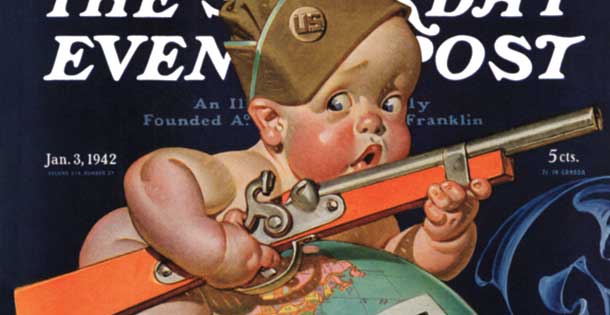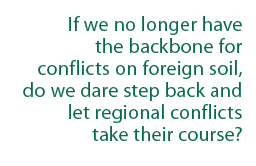Beyond our deeply embedded commitments to foreign nations, there has usually been a pragmatic subtext–money, oil, raw materials, access to markets–to whatever moral imperative we trumpeted for military action. The First Gulf War, when we went in to roll back Iraq’s takeover of Kuwait, was quite clearly motivated by our need to guarantee critical oil supplies in the Middle East. Kuwait was a major oil exporter. And our friends the Saudis were even larger players and potentially more tempting a target for Iraq’s militarist dictator, Saddam Hussein.
The problem is that we no longer really need a lot of what we’ve gone to war to guarantee in recent years. We’re nearly self-reliant in oil and natural gas. Our multinational companies have markets in so many countries that losing a few here and there for a while would be hardly noticed. And as for preserving democracy, it’s hard to persuade most Americans that this ideal is worth sacrificing their children for, especially since the targets of our generosity all too often turn on us in the end.
Take Ukraine and Crimea. Few Americans really care profoundly whether Russia absorbs them, and we don’t even have any treaty obligations to them. On the other hand, there’s Latvia, now a NATO member. “I worry that if you actually reminded Americans that we have an Article V commitment to Latvia and that we would therefore have to theoretically send American troops to defend Latvia, I’m worried about what that poll might show,” Kagan says. Article V refers to the treaty that says if one NATO member state is attacked, all member states must rush to its rescue. That means we’d then risk serving as policeman not only for Latvia, but also Lithuania, Estonia, Bulgaria, and Albania.
As distasteful as these responsibilities may seem to the average taxpaying American, the thought of fully disengaging from world affairs is just as frightening. There is a school of thought that American military power is the bulwark that holds intact the global economy, not to mention international political and social stability. If the support of America is removed, then perhaps that fragile edifice crumbles and the underpinnings of our prosperous economic system come unstuck.
“American military power forms the political framework within which the global economy that has come into existence over the last two decades functions, and functions relatively smoothly,” argues Michael Mandelbaum, director of American foreign policy at Johns Hopkins School of Advanced International Studies and a leading Democratic foreign policy advisor. “To the extent that the United States falters, it puts in jeopardy not just the security of this or that country, but also the rising tide of prosperity that the world has enjoyed over the last two decades.”
Nevertheless, there are many countries, even among our allies, who fear that too heavy an American boot print may upset the delicate balance that has grown up between democratic states and non-democratic ones. Which is why a host of our allies often hardly seem prepared to back us up when we rattle our guns. For them, at those moments, it all too often seems as though we’re rattling their economies.
Consider the Ukraine crisis. Lithuania, Estonia, the Czech Republic, and Latvia get 100 percent of their natural gas supplies every year from Russia, and even wealthy Germany relies on Russia for 40 percent of its gas. Cutting off that supply would be a devastating blow, at least for the near-term. And it could take years before enough tankers could be built, not to mention supply systems installed, to bring the equivalent amount of gas to Europe from the United States, even if Congress authorized it. So not surprisingly, these governments are a trifle on the reluctant side to stand up to a Russian regime that controls their energy supply.
Increasingly, Americans are beginning to arrive at a similar calculus. Americans do naturally believe in democracy, but, as Mandelbaum suggests, they “don’t want to pay more than what they think the policy is worth. And they calculate cost, both in terms of the cost of a particular policy and, over the long term, by how prosperous and successful they think the country is, and how well it’s doing, and how well they think it will do in the future.”
And right now, the American economy (despite a surging stock market) is quite fragile. This brings us back full circle to the question of whether we have the will to serve in the capacity of world cop–and even whether we should. It’s a fair question to ask why we should go it alone. Is not the decision to put boots on the ground in a given region rightfully a multinational problem, best faced with a united front? And if the United Nations is incapable of serving that purpose, whether out of bureaucratic or institutional paralysis, what other body might?
Finally, even if the U.S. refuses to act as good cop in major conflicts in the future, might there be some narrower situations in which we could step in with sharply targeted responses? Might there be other cases where America could simply play a supporting role? (Indeed, in late May, Obama described a new foreign policy of “collective action” and judicious restraint.)
Certainly there has been no shortage of crises in which a little military aid could be useful in restoring basic humanitarian norms. A case in point: In Mali when violent al-Qaida-linked terrorists ran rampant across the northern reaches of the African nation, American forces joined far larger detachments from France and other West African nations to restore order. There were no American combat casualties and minimal costs involved. Equally, an American presence in Somalia has been sporadic, carefully targeted, and closed-ended, confined to rapid-strike raids to rescue U.S. hostages and the maintenance of a small CIA station that provides some counter-terrorism resources and training.
Become a Saturday Evening Post member and enjoy unlimited access. Subscribe now






Comments
In the 1990’s the United States did sign a treaty, together with Russia, to guarantee the sovereignty of Ukraine, in return for Ukraine allowing Soviet era Cold War nuclear weapons to be dismantled. In retrospect Ukraine made a bad agreement. – Moscow would have been a smoking lake of radioactive glass today.
President Obama rightly saw that the JCPOA deal was the correct strategic move to allow Europe to have an alternate supplier to Russian control of oil and gas supplies. The deal was single-handedly dismantled by Vlad Putin’s Orange puppet after this article was published..
I find your first paragraph a little confusing. Surely it should have read; “For the past century, the United States has frequently gone to war under the pretense of enabling freedom and democracy, but in truth, with the purpose of protecting our sources of oil or for access to populations who would buy our goods or services”?